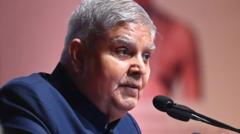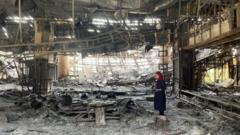Concerns over Pope Francis's health have sparked discussions on the protocols for end-of-life care for the leader of the Catholic Church, highlighting a gap in official guidelines and the pope's personal wishes.
Pope Francis Faces End-of-Life Decisions Amid Health Crisis

Pope Francis Faces End-of-Life Decisions Amid Health Crisis
As Pope Francis battles pneumonia, questions arise about the church's protocol for end-of-life decisions for a pontiff.
In Vatican City, a significant health concern has emerged regarding Pope Francis, 88, who is currently hospitalized with pneumonia. The urgency of this situation raises uncomfortable questions about what would happen if the pope were to remain in critical condition, particularly regarding his health care decisions and end-of-life preferences.
Despite having previously mentioned a resignation letter filed with the Vatican should he become incapacitated, details about its content and any advance directives remain unclear. The Vatican has chosen not to discuss potential end-of-life preferences at this time, calling it “too early” for such conversations. However, with the pope's recent respiratory crisis casting a shadow over his health, the need for clarity is becoming increasingly pressing.
In a recent bulletin, the Vatican provided an update, stating, “The clinical condition of the Holy Father remains stable,” indicating some positive signs in his recovery process, including time spent away from the noninvasive mechanical ventilation. Despite this, the reality posed by his age and health conditions prompts church experts and supporters alike to consider the implications of lacking a clear protocol for such critical decisions.
For many, questions about Pope Francis's end-of-life wishes might seem premature or invasive, yet the absence of an established public guidance on these sensitive matters within the Catholic Church continues to raise concerns. As the situation develops, the dialogue surrounding the pope's health and decisions becomes not only a matter of personal dignity but also one of ecclesiastical governance and future church leadership decisions.
Despite having previously mentioned a resignation letter filed with the Vatican should he become incapacitated, details about its content and any advance directives remain unclear. The Vatican has chosen not to discuss potential end-of-life preferences at this time, calling it “too early” for such conversations. However, with the pope's recent respiratory crisis casting a shadow over his health, the need for clarity is becoming increasingly pressing.
In a recent bulletin, the Vatican provided an update, stating, “The clinical condition of the Holy Father remains stable,” indicating some positive signs in his recovery process, including time spent away from the noninvasive mechanical ventilation. Despite this, the reality posed by his age and health conditions prompts church experts and supporters alike to consider the implications of lacking a clear protocol for such critical decisions.
For many, questions about Pope Francis's end-of-life wishes might seem premature or invasive, yet the absence of an established public guidance on these sensitive matters within the Catholic Church continues to raise concerns. As the situation develops, the dialogue surrounding the pope's health and decisions becomes not only a matter of personal dignity but also one of ecclesiastical governance and future church leadership decisions.




















